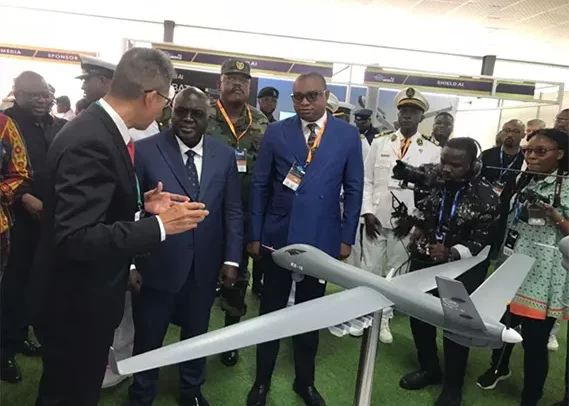Julius Debrah in talks with exhibitors at the 4th IMDEC 2025
President John Dramani Mahama has urged African leaders to devise technological strategies that will combat the threats around the Gulf of Guinea for the benefit of future generations.
Speaking on behalf of the President at the 4th edition of the International Maritime Defence Exhibition and Conference (IMDEC 2025), Chief of Staff, Julius Debrah stated that the threats confronting the maritime domain are persistent and evolving from illegal, unreported and unregulated (IUU) fishing to piracy, drug trafficking, and transnational crime among others.
“Our coastal waters continue to face significant risks, and we cannot afford to look unconcerned. Africa’s New Economy holds unlimited potential, from fisheries and offshore oil to seasonality and international trade. The seas around us are a lifeline for economic development and regional integration, yet our maritime domain is under persistent threat. In West Africa, the coast remains one of the world’s most vulnerable regions to maritime insecurity,” he stated.
He indicated that currently, threats evolve faster than ever, requiring investment in modern surveillance systems, cybersecurity intelligence sharing, and autonomous capabilities.
Speaking on the theme, “Securing Africa’s Maritime Future: Collaborative Technology and Sustainability in a Changing Geopolitical Landscape,” President Mahama indicated that this is a call for maritime security stakeholders to leverage technology and adopt a multifaceted technological approach to deny perpetrators of maritime resources.
“I wish to state that technological innovation should guide our doctrine. Maritime security must go hand in hand with environmental and economic sustainability. As we seek to secure our waters, we must also preserve them. Protecting marine biodiversity, combating pollution, and adapting to climate change are not optional. They are essential for the survival of our people and the prosperity of our future generations,” he mentioned.
Mr. Mahama stated that as a proud maritime nation, Ghana remains committed to regional cooperation and strengthening the capabilities of its navy, security institutions, and maritime stakeholders. “We will continue to support ECOWAS, the Yaoundé Code of Conduct, and the multilateral framework that promotes peace, security, and prosperity across our waters,” he added.
The Chief of Defence Staff, Rear Admiral Godwin Livinus Bessing, stated that while Ghana’s territorial waters have remained relatively stable since 2021, in April this year, a kidnapping incident occurred on board a Ghanaian flat fishing vessel just 16 nautical miles off the coast of Accra.
“This awful, unfortunate event underscores the critical need for practical and sustainable responses to maritime crime. Isolated as it may be, such incidents expose the transboundary nature of maritime threats and reinforce the shared responsibility of ensuring maritime security. Collaborative efforts to reinforce naval capabilities and enhancing port security, implementing frameworks such as the only architecture for regional information systems, and timely naval interventions have all contributed to advancing regional maritime security,” he pointed out.
BY Prince Fiifi Yorke


